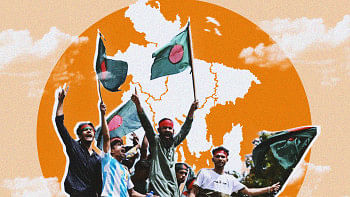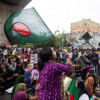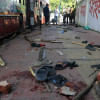Solidarity, resistance and reconstruction in Bangladesh 2.0

Bangladesh stands before a transformative political phase, driven by a people's call for a drastic paradigm shift in politics. The people have collectively emerged as a new political community—one that transcends traditional notions of the nation-state. This de novo political community is not a fleeting product of the 36 days of July but rather the culmination of years of sustained political resistance.
Shaped by different anti-fascist actors including political parties, this political community reached its full strength and potential, and manifested itself during the July Uprising. The unique characteristic of this community was the inclusivity that embraced people from all walks of life—sects, genders, political affiliations and ideologies, social and cultural orientations. But what underpins this inclusivity? At its core, two shared struggles were the basis of this inclusivity. One: is the struggle for civil and political rights, and the other is a collective commitment to the Bangladesh question.
This political community has been systematically and structurally deprived of its civil and political rights under the fascist Hasina regime for over 15 years. Despite the constitution's promises to safeguard these rights, civil liberties could not be ensured and people did not receive any real protection under the existing constitutional mechanism. To them, rights have been some sacred words on paper; rather than a lived reality.
The other foundation of this inclusivity was the Bangladesh cause. It is no wonder that the fascist regime has received patronisation from Delhi. Even the US couldn't show any visible and effective disengagement with the government in the last phase of the Hasina Regime. Recently, Bangladesh has suffered from devastating floods in Feni, Noakhali and Cumilla, in which Delhi's repeated disregard of international bilateral norms while dealing with Bangladesh played a role. A recent example is the failure to give the riparian country i.e. Bangladesh a fair warning and reasonable time before opening floodgates. This disregard has gone unchecked for years due to the lack of accountability from the Hasina government.
On a different note, there is a troubling tendency to give credit to foreign countries for this mass uprising. This not only disrespects but also gravely undermines the sacrifice of thousands of people, who fought for their rights and the unity of the people behind the Bangladesh cause. Hopefully, moving forward, this inclusive and strong solidarity will be the very force to overthrow the existing fascist elements entrenched in the power structure and any subsequent departure from the people's will. This is what we are calling Resistance. Resistance against any existent and future fascist structures and elements. The people's one-point demand was simple: 'Step down Hasina.' But behind these words lies a deeper call—to eradicate all the fascist structures and elements and pave the way for new political settlements rooted in justice.
Our resistance against fascist elements would finally lead us to the idea of reconstruction. Reconstructing every sector of the state is a mammoth task, but it must be done to facilitate the future. Debates are ongoing whether an entirely new constitution should be promulgated, or, a reformation of the existing one is sufficient. It is crystal clear that the uprising took place because the 1972 constitution failed to meet the evolving aspiration and will of the people, particularly in safeguarding civil and political rights. It has been hailed as the embodiment of the will of the people. However, the will of the people is not a static reality; it evolves with time and circumstances. Therefore, to treat the constitution as a sacred text and, hence, an immutable document is to ignore the fluid nature of the very will that it claims to represent.
Bangladesh has gone through fascism and the existing constitution paved the way through, inter alia, by empowering the prime minister in an invincible and unchecked way. Adding or substituting some words here and there in the constitution will guarantee our fundamental human rights and incorporate people's will. It is more than a legal formality and hence, human rights, as a commitment and belief, must be visualised in the ethos and core values of the state. A mere positivist approach to enforcing civil liberties won't work unless it becomes a guiding principle of our state policy and lived principles.
Lastly, the trauma of fascism often leaves people agitated toward fascists and sometimes leads them to violate the rules of law and justice as we witnessed in the case of former Justice AHM Shamsuddin Choudhury Manik's arrest and the events that followed. Therefore, to prevent this, a culture of human rights shall be nurtured gradually, and the most practical way to achieve this is through political literacy. Every political party, from its central leadership to grassroots must take the responsibility of educating its members about basic human rights. Only through a concerted effort of the state and political parties, can we hope to see human rights as a practising reality, not just a distant ideal. The resistance, built on the solidarity of diverse and different ideas, thoughts, languages, and opinions, has the power and capacity to reconstruct the country from its very core to the periphery. Let's rebuild the state!
Saleh Uddin Sifat is a law graduate from the University of Dhaka and currently works as an apprentice lawyer and serves as a member of the Jatiya Nagorik Committee.
Views expressed in this article are the author's own.
Follow The Daily Star Opinion on Facebook for the latest opinions, commentaries and analyses by experts and professionals. To contribute your article or letter to The Daily Star Opinion, see our guidelines for submission.

 For all latest news, follow The Daily Star's Google News channel.
For all latest news, follow The Daily Star's Google News channel. 









Comments